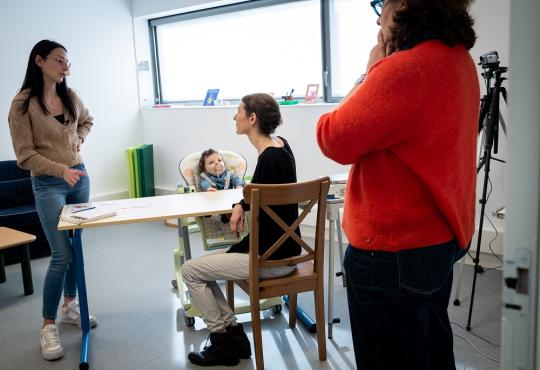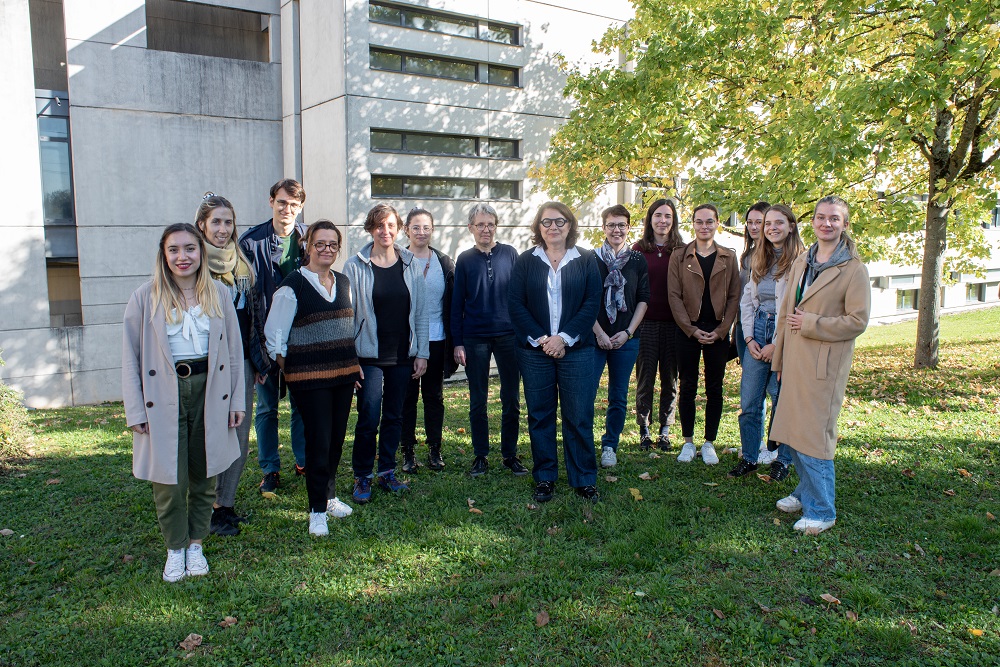
Food, Global Health Reading time 4 min
Sophie Nicklaus and eating habits: from high chair to food systems
Published on 28 November 2022
Sophie and her team study the complexities of eating habits in the small, round eyes and funny faces of babies in highchairs, facing a parent and surrounded by two video cameras and a scale — a typical experiment setting in her line of work. Designing scientific protocols to study eating habits and ultimately influence them has been the prime focus of Sophie Nicklaus’s research since she began her career.
Healthy eating for babies
Multiple studies and cohort surveys have enabled Sophie to acquire a rich body of knowledge on how eating habits develop in children. Based on this knowledge, a public health guide published in 2021 provides parents with advice on healthy eating for children, cultivating pleasure at meal times, and obesity prevention.

For the first time, this guide addresses the behavioural aspects of diet in addition to nutritional recommendations. It underscores the importance of complementary practices, including offering a range of fruits and vegetables repeatedly and not being discouraged if a food is rejected at first; encouraging chewing by introducing small food pieces even before a baby has teeth; introducing different kinds of food at the right time to develop a little one’s immune system, and avoid allergies. Because the conscious and unconscious psychological dimensions of food are fundamental, Sophie has worked to uncover the psychological mechanisms driving the development of eating habits in relation to the nutritional properties of food. She has demonstrated that the feeling of fullness brought on by certain fats in mashed artichoke will occur in the same food without these fats, by associating the flavour with the effect. “Our team includes psychologists, a rarity in food-related INRAE research units.” Parents’ behaviour when feeding their children, including insistence on their part and how they interpret signs of rejection or fullness, for example, has been studied extensively. This research converges to encourage ‘receptive feeding’, in which parents learn to identify and respect the sometimes subtle signs of fullness in children. It is important that children have control over their appetite and know to stop eating when no longer hungry.
The psychological dimensions of food are fundamental
“The research in this guide is a unique compendium of knowledge,” sums up Sophie Nicklaus. Sophie has also applied her rigorous scientific approach to building a protocol aimed at ascertaining whether recommendations in the guide, and the smartphone app developed to help parents adopt them, actually contribute to better eating habits for babies. “We will measure the babies’ body mass index (BMI) when they turn three to see if following the recommendations helps reduce BMI and thus limit the risks of obesity.”
Sustainable nutrition
Early childhood is a foundational period for the development of eating habits. “In research for my thesis, I demonstrated that food preferences established from the age of two are remarkably stable until adulthood. I found this intriguing and fascinating.” Nevertheless, room exists at any age to encourage nutritionally, environmentally, economically and socially sustainable eating habits. To address the urgent issue of climate change, in 2020 the Dijon Metropolitan consortium launched “Dijon, Alimentation durable 2030”, a vast program to promote sustainable diets, of which Sophie is the scientific director.
Schoolchildren rated the vegetarian dishes as good, or even better, than meat-based dishes
Together with her team, she leads ambitious projects in school and university catering structures. “We studied meal offers from a nutritional and environmental point of view 1 and confirmed that reducing meat consumption is the most powerful lever to improve the environmental footprint of food, without causing a nutritional deficit.” The “Super Canteen Programme” promotes the introduction of vegetarian meal options and their acceptance by canteen-goers by enhancing pleasure with all five senses. The city has added one vegetarian meal per week to school canteen menus in line with new legislation in France to promote healthy and sustainable eating. Sophie’s team is currently surveying parents to get their opinion on a second optional vegetarian meal planned for January, and possibly a daily vegetarian option. The scientists obtained encouraging results on a large scale with the help of feedback terminals installed in the canteens: on average, schoolchildren rated the vegetarian dishes as good, or even better, than meat-based dishes. “It is extremely encouraging to see that the vegetarian offer is well accepted by children”.
A similar approach has been used with university students in Dijon to understand their food preferences: 1,000 volunteer students will use a tray scanning system installed at the university dining hall in collaboration with the student services office. This system will be used to track the reactions of students to menu changes. An important pre-research phase consisted of convincing the student services office of the project’s merits based on supporting figures!
Commitment paired with patience and an understanding of political considerations
“Our diet is both fundamental and trivialized,” explains Sophie Nicklaus. We make at least 200 dietary decisions per day, and yet we fall into routines that are difficult to change.” A long process of raising awareness is necessary at all levels. To change food menus at school and university canteens, for example, you need to bring everyone on board, from cooks to school management boards! Our studies show that 25% of all dishes currently served at the university dining hall are beef-based, which is a lot! We need to show numbers to raise awareness about the power of habit and where there is room for change.”
Resilience and food sovereignty start at the regional level
At the regional level, the complexity of the entire agrifood chain comes into play. The Dijon, Alimentation durable 2030 project includes the installation of a local vegetable processing site, but there is a lack of local market gardening, which means encouraging young farmers to start businesses and produce according to specific needs. Another example is virtuous agroecological initiatives, such as planting legumes in crop rotations. Sometimes the geopolitical context gets in the way, like when grain prices soar and growing wheat instead yields better short-term profits. Dijon, Alimentation durable 2030 is a perfect example of a multi-stakeholder initiative that involves many and sometimes contradictory challenges. “We need to meet these challenges, because resilience and food sovereignty start at the regional level,” concludes Sophie Nicklaus, whose commitment and enthusiasm is unwavering.
- Nutritional assessment using the Nutriscore method. Environmental assessment using the Agribalyse 3.0 database

AND THE AWARD?
“I’m very happy to win this award in recognition of an innovative and complex area of study to understand the origins of eating habits and what is needed to change them.”
MINI-CV
51 years old
-
Education
2013: Accreditation to supervise research, University of Burgundy, Dijon
2004: PhD in food sciences from the University of Burgundy, Dijon
1995: Agricultural engineering degree, National Agricultural Institute Paris-Grignon (now AgroParisTech) -
Career
Since 2006: Centre for Taste and Feeding Behaviour (CSGA), Human Nutrition and Food Safety Division, INRAE Burgundy–Franche-Comté — research scientist until 2013, research director since 2014.
2004-2005: Monell Chemical Senses Center, Philadelphia, USA
1998-2004: Engineer at the Flavour, Vision and Consumer Behaviour (FLAVIC) Joint Research Unit (INRAE Burgundy-Franche-Comté) -
Awards and honours
2022: Decorated Knight of the Legion of Honour
2018: Danone International Prize for Nutrition, Institut Danone International
